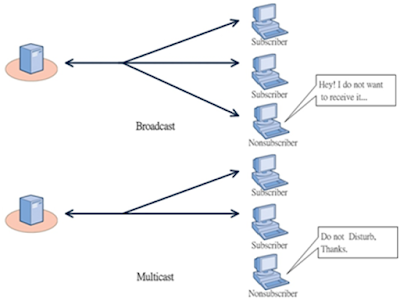Scope: Multimedia broadcast and multicast services have been introduced for WCDMA. Discuss the facilities provided by these services and illustrate this with suitable examples.
Multimedia Broadcast/Multicast Service (MBMS), specifies the transmission of multimedia service data from a single source to multiple recipients. With MBMS, many mobile users can receive the same information on a common radio channel; network resources consumption is dependent on the number of content channels rather than the number of users. When there are more concurrent users, network resources, especially radio resources, will be used in a more efficient manner.
The MBMS offers both the streaming and download delivering methods, and enables bit rates of up to 256 kbps. The multimedia content offered via MBMS can be combinations of audio, video, text, still image, and etc.
Two modes are specified for MBMS: broadcast mode and multicast mode.
In the broadcast mode, the broadcast service can be received by all the MBMS capable UE. In the multicast mode, only the registered UE can receive the multicast service, multicast and broadcast services are enabled by different phases; the broadcast mode does not include subscription, joining and leaving phases. These are user specific procedures and initiated by each multicast user. MBMS enables various applications including multimedia broadcast services, file sharing, and etc.; however, mobile TV could be the critical application in the development of MBMS.
Example
Mobile TV is gaining a lot of attention and has emerged as a major mobile application. As mobile TV receives increasing attention, there is a continuous debate over what standard should be adopted for mobile TV. Nowadays there are several dominant technologies for mobile TV such as European DVB-H, South Korean S-DMB and Qualcomm's MediaFLO. These mobile TV technologies, especially designed to bring mobile TV service to handheld devices, allow simultaneous transmission of multiple channels, high spectrum efficiency, wide coverage area, fast deployment, etc. MBMS, on the other hand, has lower spectrum efficiency and a smaller number of broadcasting channels because it is restricted by the WCDMA physical layer performance.


Great
ReplyDelete